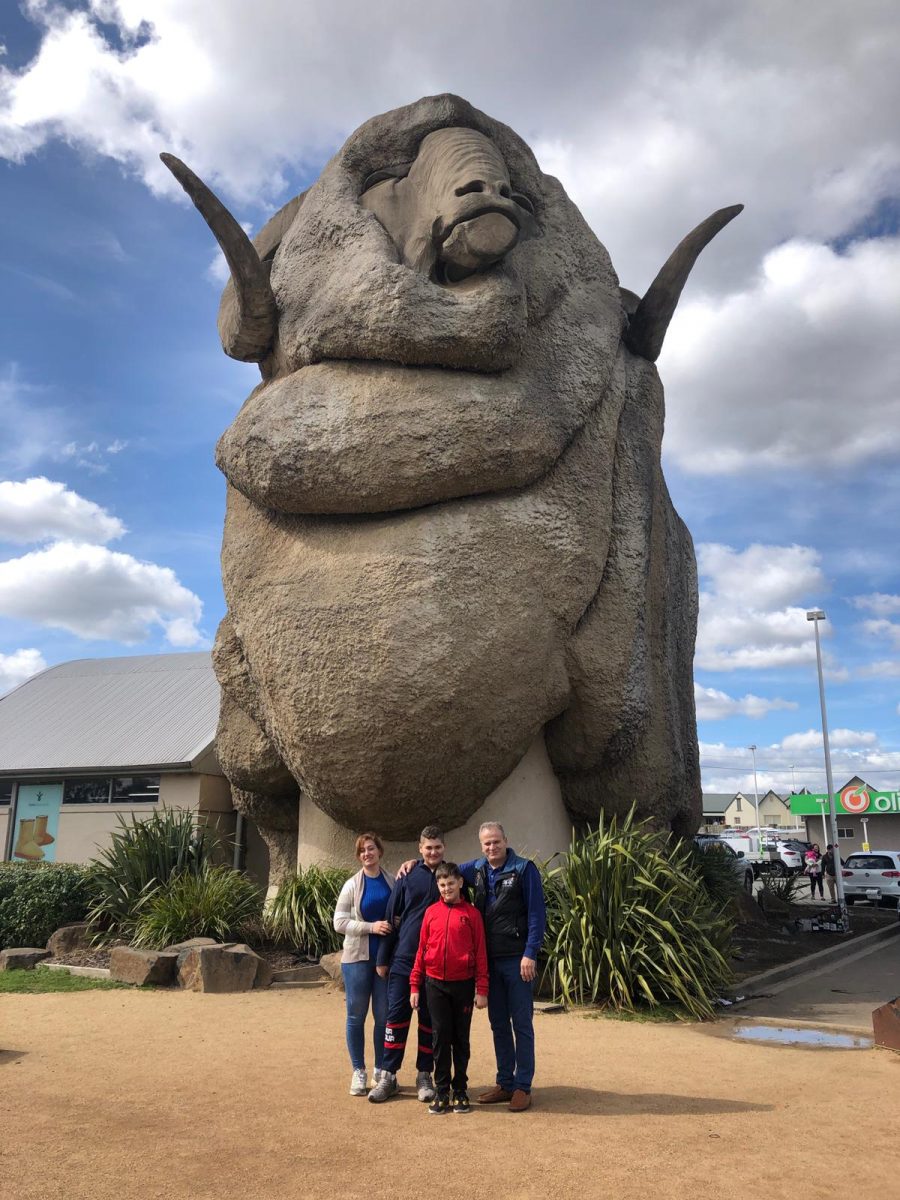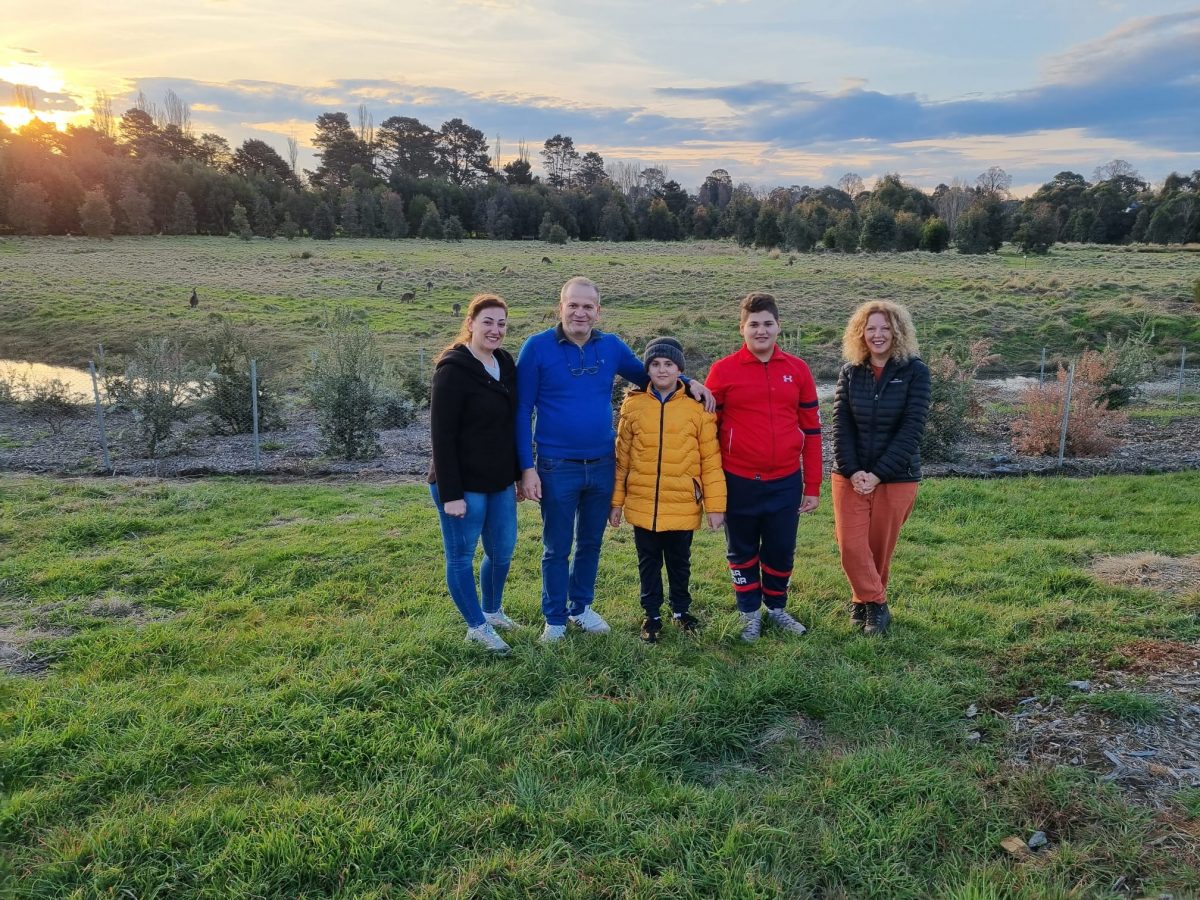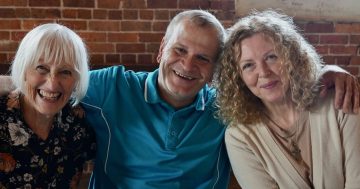
One of the first trips on the agenda for the Alkhusi family, when they settled in Goulburn, was to the Big Merino. Photo: Supplied.
It’s almost a year to the day when Mazin Alkhusi, his wife Rouba and their sons George and Elias stepped onto Australian soil.
The family had fled Syria, their home country, a place that was no longer safe for them to live in.
But thanks to a small group of Goulburn residents, they were now safe – and couldn’t have been made to feel more welcome in the regional community.
Former nurse Maggie Patterson was one of the Goulburn people who made it happen, helping to ensure that this Syrian family, which had already gone through hell, would have a better life in Australia, from day one – which meant a welcoming committee complete with signs and balloons on arrival at Sydney Airport.
Ms Patterson is the Goulburn coordinator of the Urban Monk Refugee Group, part of CRISP (Community Refugee Integration and Settlement Pilot). (Why Urban Monk? Ms Patterson and her husband Daryl live in a former ecumenical monastery in Goulburn.)
“Traditionally, refugee families often end up in cities,” Ms Patterson said. “Bringing people to regional areas, where there are less resources, means you need a really strong support network to make settlement as smooth as possible.
“Usually, refugees come into Australia under a humanitarian program, but with CRISP, they are brought to Australia and sponsored by a community group – and that unlocks a reservoir of goodness that is in the community.”
Ms Patterson said the Goulburn CRISP group was made up of 10 locals, all with various skills “so we’re not all wearing the one hat”, working together to make the Akhusi family welcome.
“This family lost everything,” she said. “The two boys, mum and dad were targeted by ISIS because Mazin was a successful businessman and leader in a regional city.”

Maggie Patterson from CRISP shows the Alkhusi family the rural beauty that is their new home – Goulburn, a far cry from war-torn Syria. Photo: Supplied.
Ms Patterson said the idea of helping people in need had been, for her, “simmering for years”.
“You’d see images, the ones at Kabul Airport, they were so powerful. How can you say no to helping these people?” she said.
“Resettlement at grassroots level is a powerful thing. When you focus on one family at grassroots level, it becomes real … that feeling of hopelessness can turn into feelings of hope. It’s a powerful thing.”
The CRISP program, which started last year, works under the umbrella of the Department of Home Affairs and the United Nations High Commissioner for Refugees, but at a community level.
”We put our hand up to help after the Government shortlists the families coming to Australia and then they match it up with the regions,” Ms Patterson said.
“Like with the Alkhusi family, what we do is meet the family at the airport and take them back to their new home. For the first few weeks, we organise temporary accommodation for them and help with places like Centrelink and Medicare.
“When they arrive in their new home, we give them a welcome pack, a fridge full of food, warm beds and host them for a few weeks and help them find their own home, government services, get the kids into school, English classes for the parents, connect with a doctor, orientate themselves with regional Australia – whatever they need.”
It’s not just CRISP that has helped the family. After Mr Alkhusi got a job at the poultry plant in town, a car was given to him so he could get to work and the Goulburn Rotary Club organised free driving lessons for him. The local Men’s Shed provided pushbikes when they first arrived so the family could get around and the boys have been welcomed by local sporting, youth and music groups.
“It is wonderful to see this family embraced by the Goulburn community,” Ms Patterson said.
“All we want to do is provide a soft landing for families who have been living with trauma.”
A meeting was held in the Yass Valley last week to determine interest in hosting a family in the region, also through the CRISP program.
More information about the program is available on its website.








